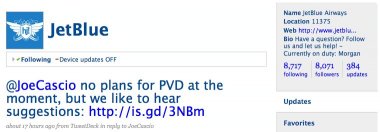Maybe it's because that sexy beast Kevin Smith has been all over the universe with the press push for Clerks II and my old friend/roommate/moocher extraordinaire Paul...
trust, twitter, and those holiday travel blues
I have always loved airports, and flying. The whole experience is still glamorous and exciting to me.
Of course, I never travel on the holidays. This might explain a lot.
This morning I read this post by an MIT student about her frustrations with an unnamed airline as she struggled to get home for the holidays. She starts off by asking her airline's CEO:
Have you ever ridden on an airplane? During the Holiday Season? Without your Super-Sparkly-Platinum member's benefits? Incognito, so that your employees don't know that they need to behave around you? Might I make a small suggestion? DO. Then go back to your interviews and repeat, "We need to take excellent care of our customer," and MEAN it this time.
Here's a sample of the contradictory information the MIT student got during her ordeal:
"We'll arrive in time for your delayed connection."
"Though you sprinted through the airport and made the connection, we decided to give your seat away."
"You definitely have a seat on the next flight."
"The next flight has been canceled. Since before you spoke with the last agent. There is no hope for you."
"Oh, you can standby on another airline. Let me transfer that ticket."
"What? They say we haven't transferred the ticket? Well, that's because we aren't allowed to. No, it's not possible. I don't care if they say it needs to be done. I don't care if the other employee told you she did it. You have issues with communication."
No, I'm sorry, you, the airline have issues with communication. And with trust. What happens after we, the customer, receive a few contradictory messages like this is that we lose faith in anything anyone wearing that company badge tells us.
But Twitter is built on trust -- that's why we insist on talking to real people we can call by name, even if you are representing a brand.
When I tweeted @comcastcares (who I know from his profile information is actually Frank Eliason) that my service was out after the last snowstorm, he told me something different (and, it happened, much better) from what the guy on the Comcast 1-800 number had told me minutes before.
Who did I trust? Frank. Who turned out to have been right? Frank.
Turns out, @JetBlue and @SouthweastAir use Twitter. How do they manage their customers' trust on Twitter?
The first thing I noticed is that both of these companies publish and (if necessary) change the name of the person on the profile who is staffing the account at any given time (see "currently on duty"):


This is really important, because Twitter works best when the interaction is personal, real, and human. In fact, it's the only way it works at all. We need a name, if we're going to trust.
So what does this do? How does this help? Is the only thing accomplished here adding another channel of information to a subset of customers who use Twitter?
No, because the secret ingredient is trust. The thing that Twitter does is it archives and makes visible your conversations with other customers over time. So if I want to talk to Jet Blue, I check out their Twitter profile to see what kind of conversations they tend to have with people. How human are they? Are they funny? Helpful? When was the last time they tweeted?
Based on the answers, I can decide the level of trust I have for them. This kind of archived conversation isn't available anywhere else, except maybe on some forums and bulletin boards, which don't offer the same immediacy, nor are they as public as Twitter. I can't go through transcripts of customer service phone conversations to see how well they do with that channel. But I can watch how you behave, publicly, over time, on Twitter. And that builds trust.
A new report just released from the Society for New Communications Research confirms the link between brand management and customer care.
Among the findings, when a customer is considering a purchase:
- 72% use social media to learn about the level of customer care offered by a company
- 74% make their purchase decisions based on the customer care information they find online.
On Twitter you can:
- Respond immediately when a customer mentions your company, your competitor, your product, or your industry
- Make the customer feel like the the company hears them and is responsive to their needs
- Find out valuable information about what your customer experience is really like (and respond accordingly, one hopes)
The SNCR report also found that only 30% of customers believe that companies take their customers' opinions seriously.
That's atrocious.
How do you use Twitter when you're having problems with a company? Do you trust what someone from a company on Twitter tells you more than what they tell you through another channel? What can companies do better to earn your trust?

